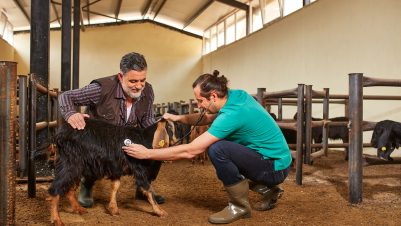In our series on the hopes and expectations of aspiring and qualified vets, we have heard from school leavers, vet students and recent graduates. This month, it’s the turn of someone at the peak of their career.
Clive graduated from Liverpool in 1985 and is a director of a group of practices in the Midlands. I put to him a similar series of questions as I did to the others and asked what he thinks the future will bring for our previous interviewees.
Why did you want to be a vet?
As a teenager in a state school secondary modern (not a comprehensive but a school for children who were just post 11+ and unable to afford private education), I was good at science and maths and seemed to shine academically. I wanted to work for myself, own my own business and do a bit better in life than my parents. The school careers officer laughed me out of his office and told me that my ‘sort’ would do better by getting an apprenticeship with a local French tyre manufacturer. People like me did not do well at university. All the teachers at that school sent their children to the private school across the road. So, I think I was just very bloody-minded.
Is it what you expected it to be (financially and in more general terms)?
I had no financial expectations. My first job was a one-in-two on-call rota in Antrim; it paid £6,000 a year plus a car and a flat in an average dairy practice with endless TB testing. They were very nice people who would give you anything except money. Today I probably earn what I want to earn and it’s fine, but it has been a long road getting there. It’s always been exactly what I expected it to be.
If you were 18 now, would you do it again?
Equipped with my current knowledge of the profession, probably not. Poor people become vets less frequently now than in 1980-85. The starting salaries would not compensate a poor individual for all the borrowings required to navigate the course. Social mobility has been stifled by tuition fees. I [started my career in a] minimalist referral culture. The only places to refer in 1985 were the universities; you just had to get on with it most of the time. That creates pressures, but it also creates opportunities. These days I may be performing intra-ocular surgery one day, spinal surgery the next day, a TPLO on Wednesday and a day of routine neuters and dentals the following day. In today’s world, I would have to have undergone a training residency and passed diploma examinations to perform [any] one of the first three days’ surgeries. The prospect of getting to my current level of expertise and experience in someone else’s practice without a procession of internships and residencies is zero. I would have no wish to become a routine neuter and minor surgery person; [that’s] not something I find at all palatable.
What do you think the future will bring for the next crop of graduates?
I think the corporates and out-of-hours clinics have probably made life better or more stable for new graduates. There were a lot of bad small practices run by some not very nice people until the last 15 years, and it’s a relief that most have changed hands and been bought out. What is left then is a profession of employees, with no real prospects of ownership. As fees are pushed downwards, salaries
The school careers officer laughed me out of his office…
must follow, combined with a saturated market and overproduction [of vets]. The current Brexit-induced famine will be a short-lived glitch. Quality of life will be less because spare time is useless without spending power, a nice home and home life. It will become a profession of parttimers who have a spouse who does something else that makes the money. The bloated referral world will collapse when the insurance bubble bursts; sadly, the skill base at first opinion level will have been so depleted and eroded that no one will be in a position to take advantage of the vacuum. All things considered, it looks a bit grim.











